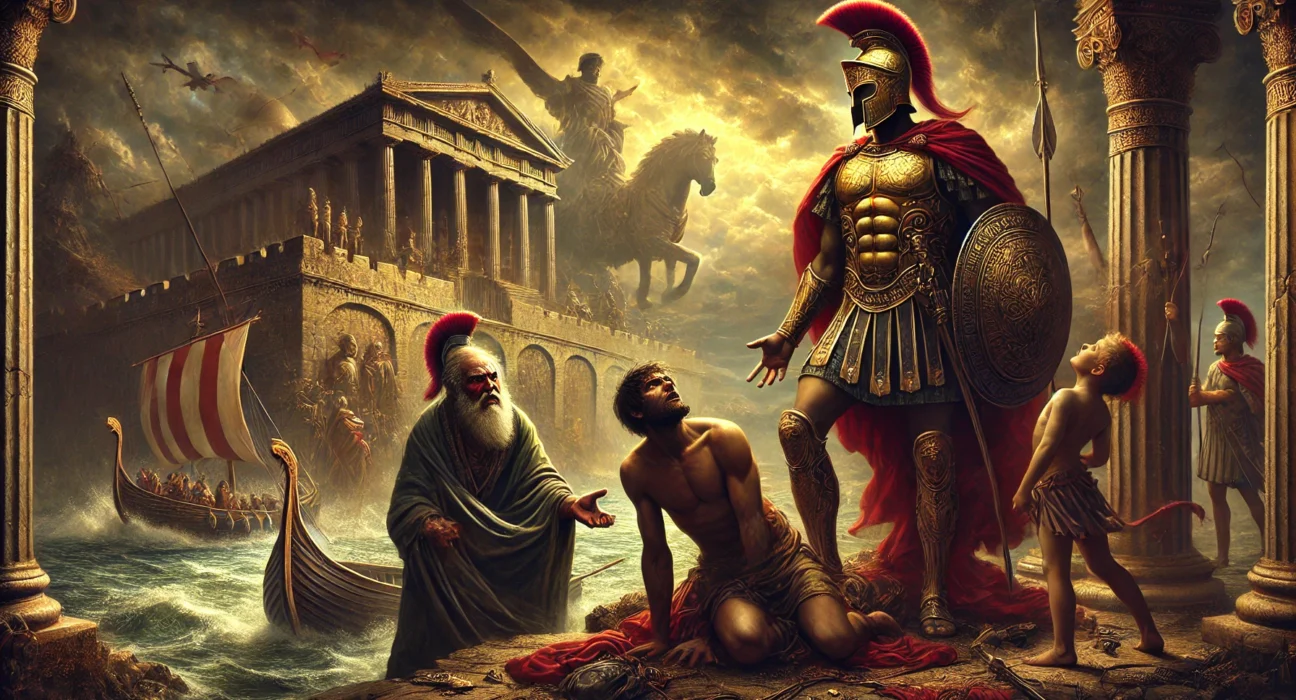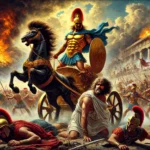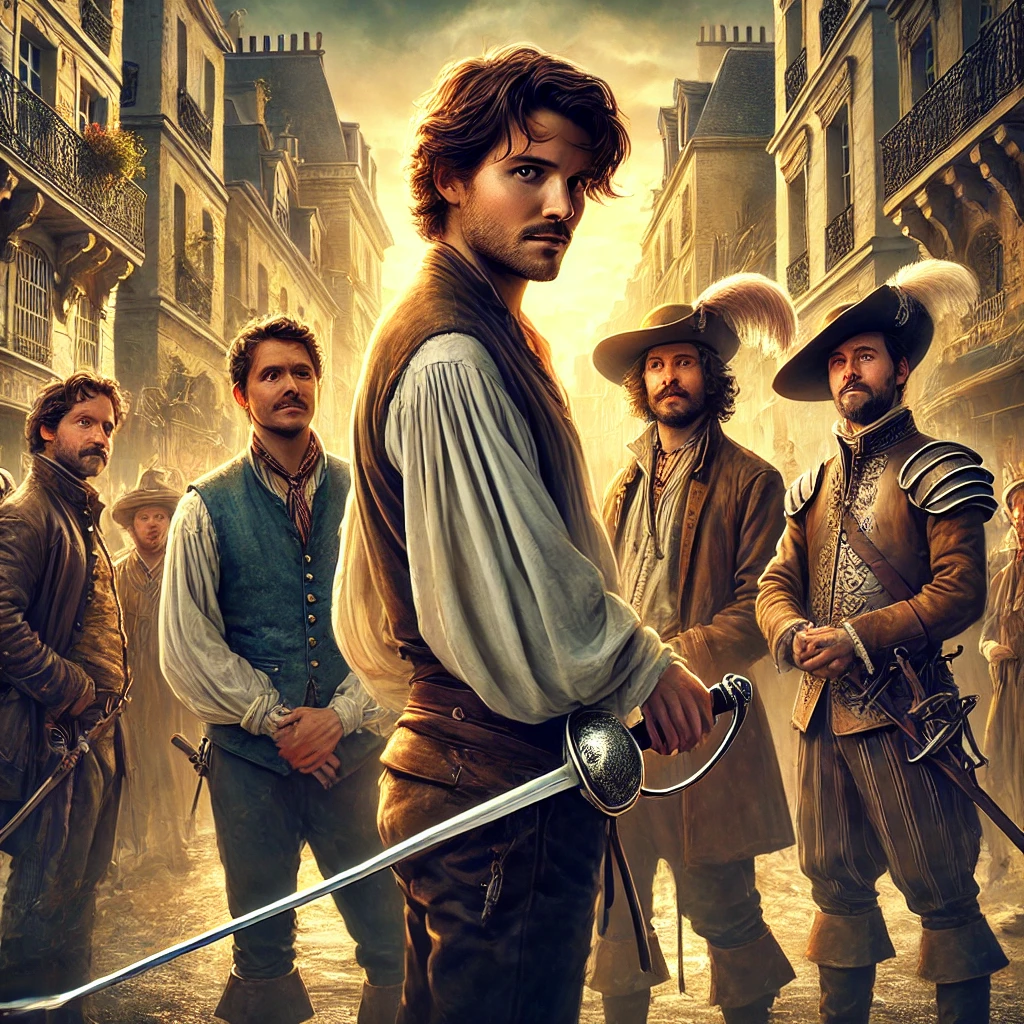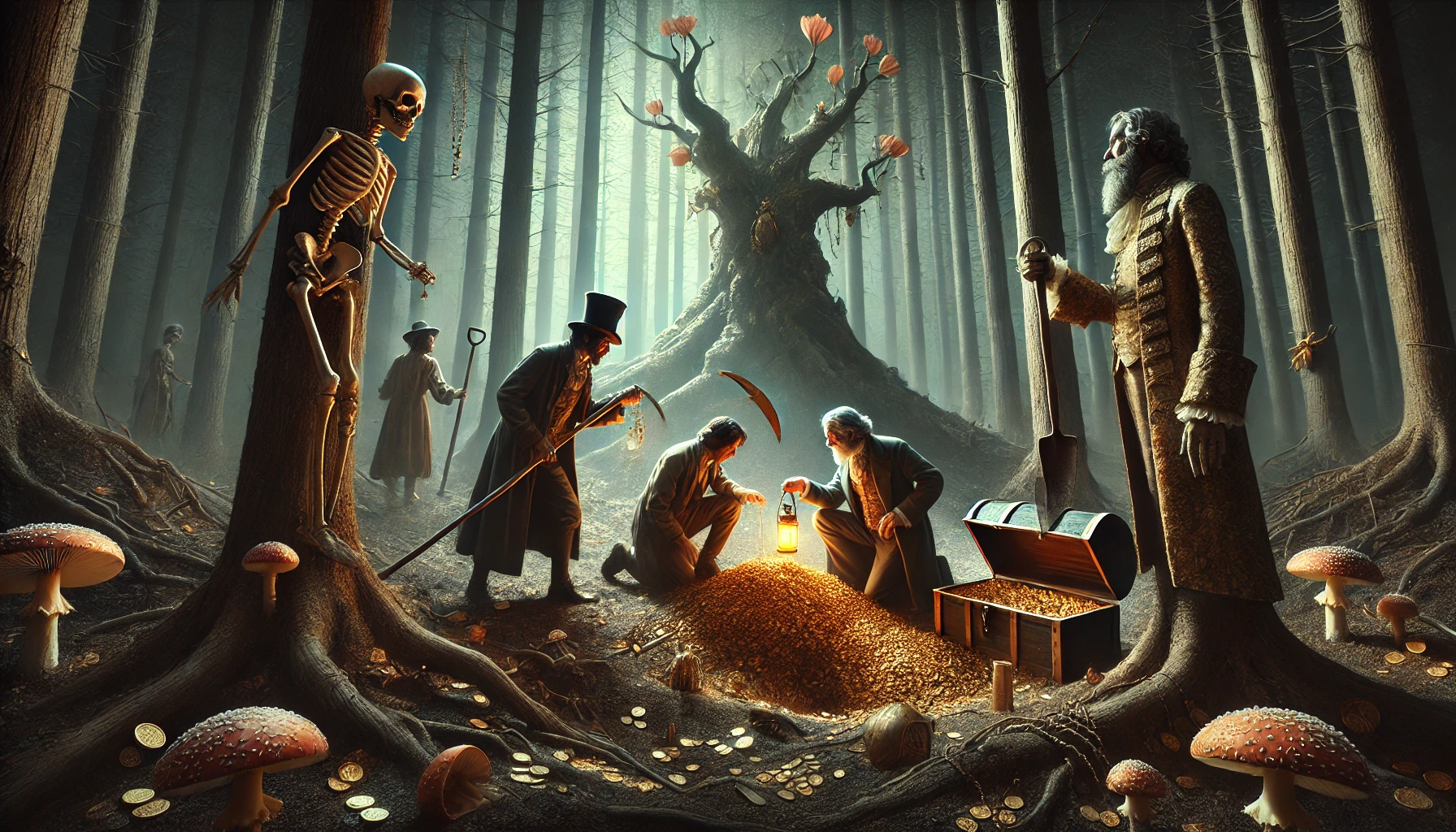The Iliad and The Odyssey are two of the most famous and foundational works of ancient Greek literature, both attributed to the poet Homer. Written in the 8th century BCE, these epic poems tell two interconnected yet distinct stories.
The Iliad takes place during the final year of the Trojan War and focuses on the Greek hero Achilles, his wrath, and the consequences of his actions. It explores themes of honor, pride, and the tragic nature of human life, with a specific emphasis on the concepts of fate and glory.
The Odyssey is set after the fall of Troy and follows the hero Odysseus as he embarks on a ten-year journey to return home to Ithaca. While The Iliad deals with war, The Odyssey emphasizes themes of homecoming, cleverness, perseverance, and the struggle against both human and divine obstacles.
Together, these works form the cornerstone of ancient Greek culture and have profoundly influenced Western literature and storytelling.
Plot Summary
The Iliad
In the final year of the Trojan War, a deadly feud between two great Greek leaders erupts—Achilles, the mightiest warrior, and Agamemnon, the king of men. Achilles’ rage is kindled when Agamemnon dishonors him by seizing Briseis, a woman Achilles claimed as a prize of war. The gods observe from afar, their own disputes shaping the fate of mortals. Apollo, angered by Agamemnon’s arrogance, sends a plague upon the Greek camp, further adding to the Greeks’ suffering.
Achilles, humiliated, withdraws from the battle and refuses to fight, leaving the Greek army vulnerable against the Trojan forces led by the noble Hector. Without Achilles, the Greeks falter. Despair spreads across the Greek camp as Hector drives them back towards their ships, threatening to end the war in favor of Troy.
In the heavens, the gods take sides, with Athena, Hera, and Poseidon aiding the Greeks, while Apollo and Aphrodite protect the Trojans. Zeus, the king of the gods, commands the flow of battle, balancing fate and the whims of deities. As Achilles broods in his tent, his closest companion, Patroclus, begs to take his place in battle, wearing Achilles’ armor to rally the Greeks. Achilles relents, though with a heavy heart, knowing that Patroclus is no match for Hector.
With the sight of Achilles’ armor on the battlefield, the Greeks find renewed hope. Patroclus fights valiantly, but the fates have already woven his doom. He faces Hector, and in a fierce clash, Hector slays him, stripping Achilles’ armor from his body. Grief-stricken and enraged by the death of his dearest friend, Achilles returns to the battlefield, his wrath now uncontainable. He reconciles with Agamemnon, putting aside their quarrel, and vows vengeance against Hector.
Achilles dons new armor, forged by the god Hephaestus, and sets out with divine fury. He slaughters Trojans by the dozens, and the river Scamander rises up in anger at the carnage, nearly drowning him. The gods intervene, and the war between gods and mortals reaches its peak, but none can stand before Achilles.
Finally, Achilles confronts Hector at the gates of Troy. Knowing his fate, Hector stands firm, but Achilles is unstoppable. The two engage in a duel that shakes the foundations of the city. Achilles, in his fury, slays Hector and ties his body to his chariot, dragging it around the walls of Troy in an act of desecration. The grief of Hector’s family, especially his father, King Priam, and his wife Andromache, is boundless.
After many days, Priam, guided by the god Hermes, makes a dangerous journey to the Greek camp. He enters Achilles’ tent, unarmed and vulnerable, and pleads for his son’s body. The scene is one of heartbreaking sorrow, as Priam appeals to Achilles’ sense of humanity, reminding him of his own father. Moved by the old king’s courage and grief, Achilles relents. He returns Hector’s body, allowing Priam to carry his son home for a proper burial.
Though the war continues, the epic closes on this moment of shared grief and compassion, as Hector’s body is laid to rest, signaling a temporary pause in the bloodshed. The fate of Troy and its people hangs in the balance, but for now, both sides retreat into their camps, reflecting on the cost of war.
The Odyssey
Far from the smoldering ruins of Troy, the great hero Odysseus battles not on fields of war, but against the whims of gods, monsters, and fate itself as he seeks to return home to Ithaca. It has been ten long years since the fall of Troy, and Odysseus’ journey has been a tale of endless detours and trials, each pushing him further from his beloved wife, Penelope, and his son, Telemachus.
Held captive by the nymph Calypso on her island, Odysseus longs to return to his family. On Mount Olympus, the gods convene, and with Athena’s persuasion, Zeus orders his release. Hermes, the swift messenger, brings word to Calypso, who reluctantly sets Odysseus free. Crafting a raft, he sets sail once more, but Poseidon, god of the sea, still burns with anger against him for blinding his son, the Cyclops Polyphemus. With a mighty storm, Poseidon wrecks Odysseus’ raft, casting him onto the shores of the Phaeacians.
There, he is welcomed by King Alcinous and his daughter Nausicaa. In their court, Odysseus tells the tale of his journey, recounting his escape from the land of the Lotus-Eaters, his deadly encounter with Polyphemus, and his harrowing passage through the lands of Circe, who turned his men into swine. He tells of his descent into the underworld, where he sought counsel from the dead, including the blind prophet Tiresias, who foretold even more suffering.
Odysseus recalls the temptation of the Sirens, whose songs nearly lured him and his men to their deaths, and the monstrous threats of Scylla and Charybdis, who claimed many of his crew. Yet his greatest sorrow was the loss of his men on the island of Helios, where they, driven by hunger, defied divine orders and slaughtered the Sun God’s cattle. Zeus, enraged by their disobedience, struck their ship with a thunderbolt, killing all but Odysseus, who drifted alone to Calypso’s island.
Moved by his tale, the Phaeacians offer Odysseus a ship, and he finally sails homeward, though the years have changed much in Ithaca. His palace is overrun by suitors vying for Penelope’s hand, believing Odysseus long dead. Telemachus, now a young man, has searched for news of his father, but upon his return, he finds only frustration. The suitors devour his family’s wealth and mock his authority.
Disguised as a beggar by Athena, Odysseus returns to Ithaca in secret. He first reveals himself to Telemachus, and together, they plot the downfall of the suitors. Testing their loyalty, Odysseus moves among the suitors in his disguise, enduring their scorn. Meanwhile, Penelope, ever faithful, devises a contest: she will marry whoever can string Odysseus’ great bow and shoot an arrow through twelve axe heads, a feat only the hero himself can perform.
One by one, the suitors fail. Finally, Odysseus, still disguised, steps forward. He strings the bow effortlessly and sends the arrow true through the axes. Revealing his identity, he, along with Telemachus and a few loyal servants, slaughters the suitors in a bloody confrontation.
Penelope, cautious even now, tests Odysseus one last time. She orders their marriage bed to be moved—a task only the real Odysseus would know is impossible, as he built the bed himself from a living olive tree. When Odysseus reacts in outrage, she knows it is truly him, and the long-separated couple is finally reunited.
Peace is restored to Ithaca, but Odysseus’ journey is not yet fully over. The ghost of Tiresias had foretold that he must make one last voyage to appease Poseidon. Yet, for now, Odysseus stands victorious, having reclaimed his home and family after years of hardship.
Main Characters
The Iliad:
Achilles – The greatest warrior among the Greeks, Achilles’ withdrawal from battle due to a conflict with Agamemnon over honor drives the central plot of The Iliad. His rage and eventual reconciliation with his fate as a doomed hero are key elements of his character arc.
Agamemnon – The king of Mycenae and commander of the Greek forces, Agamemnon is a powerful but often arrogant leader. His dispute with Achilles over the war prize Briseis sets off a chain of events that threatens the Greek war effort.
Hector – The Trojan prince and greatest warrior of Troy, Hector is portrayed as a noble and devoted character, fighting for his family and city. His eventual duel with Achilles becomes the tragic climax of the epic.
Patroclus – Achilles’ close friend and companion, whose death at the hands of Hector brings Achilles back into the war, and ultimately leads to the final showdown between Achilles and Hector.
Priam – The aged king of Troy, Priam represents the toll the war takes on both sides. His plea to Achilles for Hector’s body is one of the most moving scenes in The Iliad.
The Odyssey:
Odysseus – The hero of The Odyssey, Odysseus is the king of Ithaca known for his intelligence, cunning, and resourcefulness. His journey home after the Trojan War is marked by encounters with mythical creatures and divine intervention, as he strives to return to his wife and son.
Penelope – The faithful wife of Odysseus, Penelope is known for her loyalty and intelligence. She cleverly keeps her suitors at bay for years while waiting for Odysseus’ return, embodying the ideal of faithfulness.
Telemachus – The son of Odysseus, who comes of age during The Odyssey. His journey to learn about his father and protect his mother from the suitors parallels Odysseus’ own quest.
Athena – The goddess of wisdom, Athena is Odysseus’ protector throughout his journey. She represents intelligence and strategy, guiding both Odysseus and Telemachus.
Poseidon – The god of the sea and the main antagonist of Odysseus. Poseidon harbors a grudge against Odysseus for blinding his son, the Cyclops Polyphemus, and continually thwarts his journey home.
Theme
The Iliad:
Honor and Glory – Central to The Iliad is the concept of kleos, or glory, which warriors like Achilles seek on the battlefield. The conflict between personal honor (Achilles) and collective responsibility (Agamemnon) shapes much of the epic.
Fate and Free Will – Characters in The Iliad are often caught between their fates and their personal choices. The gods play a significant role, but humans are still accountable for their actions, leading to tragic outcomes.
Rage and Revenge – Achilles’ wrath is the driving force of the poem, and revenge plays a critical role in the narrative. The cycle of violence, both personal and collective, underscores the destructive nature of war.
The Role of the Gods – The gods frequently intervene in human affairs, either aiding or hindering characters. This reflects the Greek belief in the gods’ direct influence on the world, as well as the capricious nature of divine intervention.
The Odyssey:
Homecoming and Perseverance – The Odyssey is fundamentally a story about returning home. Odysseus’ journey represents both physical travel and a personal transformation, as he learns humility and patience along the way.
Cunning and Intelligence – While The Iliad celebrates physical strength, The Odyssey highlights the importance of wit and strategy. Odysseus is not only a skilled warrior but also a clever tactician who outwits his enemies, including the gods and monsters.
Hospitality – Known as xenia in Greek, hospitality is a major theme in The Odyssey. The treatment of guests, both good and bad, plays a pivotal role in the hero’s encounters with various characters, from the welcoming Phaeacians to the hostile Cyclops.
The Power of Faithfulness – Penelope’s loyalty to Odysseus and Odysseus’ desire to return to his family underline the importance of faithfulness in relationships. This is mirrored in the disloyalty of the suitors and some servants.
Writing Style and Tone
Homer’s writing style in both epics is marked by the use of formal, elevated language and extended similes—the famous Homeric or epic similes—which compare heroic events to everyday occurrences in nature or daily life. The tone of The Iliad is often somber and tragic, reflecting the gravity of war and the fleeting nature of life. The language is highly formal, with characters often delivering lengthy speeches that reinforce their heroic status and the weight of their choices.
In contrast, The Odyssey has a more varied tone, blending moments of tension, wonder, and even humor. The narrative voice in The Odyssey is more episodic, moving from one adventure to another, while maintaining a reflective tone that underscores the trials of Odysseus. The style also highlights the theme of storytelling itself, as many sections involve characters narrating their own experiences or tales within the story, creating a layered narrative structure.
The oral tradition is deeply embedded in both epics, seen in the use of repetitive phrases (epithets) like “swift-footed Achilles” or “wily Odysseus.” These stylistic choices help to maintain the rhythm and mnemonic patterns that were essential for the oral recitation of these works.
We hope this summary has sparked your interest and would appreciate you following Celsius 233 on social media:
There’s a treasure trove of other fascinating book summaries waiting for you. Check out our collection of stories that inspire, thrill, and provoke thought, just like this one by checking out the Book Shelf or the Library
Remember, while our summaries capture the essence, they can never replace the full experience of reading the book. If this summary intrigued you, consider diving into the complete story – buy the book and immerse yourself in the author’s original work.
If you want to request a book summary, click here.
When Saurabh is not working/watching football/reading books/traveling, you can reach him via Twitter/X, LinkedIn, or Threads
Restart reading!








